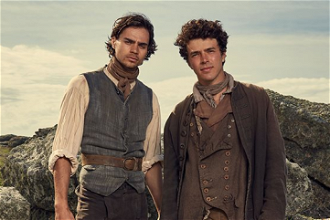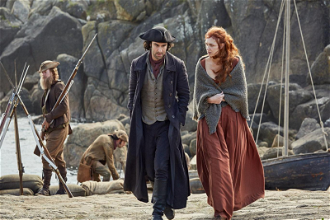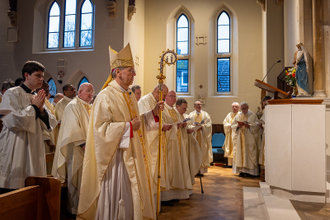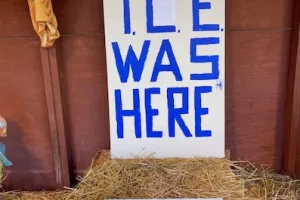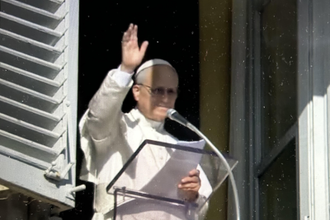Poldark - Quality television and a spiritual experience
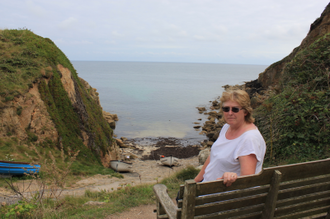
Ellen Teague at Porthgwarra Beach - one Poldark location
Last night's thrilling final episode of Poldark Series 3 left me emotionally exhausted, and around five million others as well. Many are lamenting on social media that Sunday nights will now be so dull without further story development for at least a year. Poldark has been an outstanding popular drama, one of those unique and subtle productions that go beyond entertainment to be a spiritual experience. I will miss its quality and engaging story-telling - screened without disruptive adverts - the talented cast, the literal cliff hangers and stunning scenery. I am so delighted that leading characters Ross and Demelza were still embracing at the end. Congratulations to Mammoth Screen and all involved.
The gorgeous camerawork, linking the rugged environment and the movement of the ocean's waves with the upheavals of life, combined with Anne Dudley's haunting music, has linked three powerful series. In Series 1, who could forget the central character and hero Ross Poldark carrying the tiny coffin of his daughter along the coast to her burial. We cried with him on that grey day, as the camera work contrasted her death from diphtheria with the living environment, and the music 'The Longest Walk' underlined the momentous grief at the loss of a child. Anne's beautiful songs, particularly 'Greater love hath no man' which marked the death of mine captain Henshawe in Series 3, have had tens of thousands of youtube hits.
The natural environment of Poldark's Cornwall of the late 18th century has a passion that reflected the dramatic lives of local people. It is truly wonderful to learn that so many beautiful beaches, cliffs and moors remain unspoilt today. From Holywell Beach to Bodmin Moor to the Botallack Coast, the ghosts of all those generations that enjoyed the landscape and made a living off it have been keenly felt. The tragedies are recalled too. Wheal Owles, the mine at Botallack that doubles as Wheal Leisure in Poldark saw one of the worst Cornish mining accidents in history on 10 January 1893. Of the 41 people working at the mine, 20 died and their bodies were never recovered.
Ross Poldark is from the Cornish landed gentry but he has a strong moral compass. He struggles to keep mines open to save the jobs and livelihood of the workers who would otherwise face starvation or the debtors' prison. He even gives part of his land for people to grow food on. He upholds traditions of mutual obligation among relatives, neighbours and the local community around hard work and decency. However, he is no sugary hero and his flaws make him all the more fascinating.
This third series, as with the other two, offered a raw portrayal of life and death in the context of turbulent times that had a contemporary feel to it. Social justice was highlighted - the enclosure of common grazing land, power of bankers, the tough working conditions of miners under insensitive mine owners, the control of political power and resources by wealthy landowning elites, and a backlash against it. Was this really the late 18th century? It has been said that one of the huge achievements of Debbie Horsfield's adaptation of the Poldark novels is its determination to dramatise, alongside the interpersonal relationships, the core social conflicts experienced by a largely rural population facing industrialisation for the first time. We see what it means to be human in a society driven by market forces and private ownership. Ross bucks the rules of the time in marrying his kitchen maid and counting people from all classes among his friends.
Of course, Aidan Turner in the lead role of a smouldering Ross Poldark has not so much played the romantic lead as inhabited it. He is handsome to be sure, never more so than with galloping around clifftops on his horse with windswept long hair, scything or engaging with the two women he loves. He has a gorgeous smile and a range of facial expression that makes his face forever interesting. The camera loves him. He can convey torment and grief - even menace - as convincingly as gentleness and love. Ross also has some quirky views for that period which I absolutely agree with. In Series 1 he was asked about the US War of Independence in which he fought and he responded, "like any war, a waste of good men". Ross knows about the horrors of mass conflict. "War takes a man places no one can ever follow," he says. Like many soldiers, he has learnt the devastating consequences of war, not least the plight of prisoners of war, including his gentle friend Doctor Dwight Enys. In this final episode he resisted ordering a bloodbath to protect private property in favour of promising to bring about long-term change through dialogue and political engagement.
Then there was Ross's nemesis, the greedy and ambitious banker George Warleggan, played with nuanced vulnerability by Jack Farthing, who focuses completely on increasing his wealth and social status. And yet in this series we learn that he was bullied by Ross at school and goes on himself to bully the elderly Agatha Poldark, played brilliantly by Caroline Blakiston. Agatha's final moments of life at the age of 98 were all the more poignant because of the lack of respect shown her by George. The attention to detail is such that we see hints that George suffers from the anxiety disorder OCD. We saw him crack up last night when his wife, Elizabeth, threatened to leave him because of his jealousy and vindictiveness, and he appeared to promise reform.
The lack of power of Agatha and the two women in Ross's love triangle - Demelza (Eleanor Tomlinson) and Elizabeth (Heida Reed) - forces them to rely on men for their social status and income. The perils of arranged marriage, rape, childbirth without anaesthetic, and the sheer lack of freedom of women at that time all feature. Yet, the women have strong characters and we see an elopement by cousin Verity (Ruby Bentall) to marry the man she loves, and decision-making by Demelza about Poldark property while Ross is overseas.
Eleanor Tomlinson, like Aidan Turner, is blest with a fascinating face that looks very different in varying circumstances. It could scowl in an ugly way when she was angry with Ross - and that was throughout most of Series 2 - or look radiant in happier circumstances.
These days, twitter lets us glimpse the lives of the cast and it impresses me that many of them demonstrate they have a social conscience. Beatie Edney (Prudie) has been a generous volunteer at centres helping victims of London's Grenfell Fire. Gabriella Wilde (Caroline) has urged a response to the East Africa drought and famine. Ruby Bentall regularly promotes justice and peace campaigns, and she gave climate change awareness a huge boost in November 2015 when she photographed Aidan Turner in a tee-shirt advertising London's Climate March that month. Twitter feeds giving glimpses behind the scenes of filming or out-takes is an important tool these days for keeping an audience engaged between episodes. I enjoyed cast members practicing how to collapse and die after being shot, and the clip suggesting that the biggest diva on set was the dog Horace.
Aidan Turner was recently voted Radio Times Drama Champion for the third year in a row and Poldark is always popular with public votes, taking home the Radio Times Audience Award at the 2016 British Academy Television Awards. I'm guessing that in the future Ross Poldark will be torn between entering politics at Westminster, trying to improve human rights and social justice at national level, and remaining in his beloved Cornwall, enjoying a quiet life with his family. We saw a glimpse of him in London, so I think we see where he is heading. Winston Graham's books will provide wonderful stories for Series 4, which begins filming in September, and, hopefully, Series 5.
But I said that watching Poldark has been a spiritual experience. Organised religion does feature, moving between the selfishness of a vicious career vicar, to the baptism of babies, to the community spirit of Methodism, but I mean something different.
In last night's final episode of Series 3, the sense of wonder and awe at the natural world continued. All those longing looks out to the sea by many characters gave insight into the calming effect of the environment, and the hope in each sunrise and a new day. An increase in altruistic feelings and behaviour to favour the common good has been seen thoughout the series. Thankfully, when Ross came across a distressed George on a beach in the last episode, he resisted teasing him and even smiled at him. A bridge was built. In this series, forgiveness is key in the imperfect relationship between Ross and Demelza, reflecting the continuing need to work at a fruitful marriage and build loving relationships with family and friends.
Poldark, like all good drama, has prompted reflection on our own lives through the conflicts, issues and emotions it has raised. I love visiting Church Cove at Gunwalloe on The Lizard where the Church of the Storms was the location for the Penvennen-Enys wedding in this third series, and its bell tolled at the sight of French ships last night. It is the only Cornish church sited on a beach and dates back to the 13th century. Many a shipwrecked sailor has been buried there over the centuries, and yet the graveyard and notice board demonstrate how the church is still a central meeting point for the local community. And for all visitors - and there are plenty on the Poldark Trail - it is one of the places for quiet contemplation and prayer.
See Letters: www.indcatholicnews.com/news/33144



